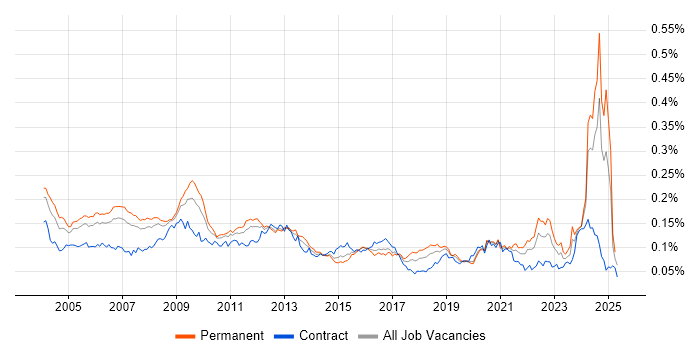System Architect
UK
The median System Architect salary in the UK is £65,000 per year, according to job vacancies posted during the 6 months leading to 29 May 2025.
The table below provides salary benchmarking and summary statistics, comparing them to the same period in the previous two years.
| 6 months to 29 May 2025 |
Same period 2024 | Same period 2023 | |
|---|---|---|---|
| Rank | 635 | 728 | 858 |
| Rank change year-on-year | +93 | +130 | +213 |
| Permanent jobs requiring a Systems Architect | 73 | 187 | 95 |
| As % of all permanent jobs advertised in the UK | 0.13% | 0.18% | 0.098% |
| As % of the Job Titles category | 0.15% | 0.19% | 0.11% |
| Number of salaries quoted | 54 | 96 | 32 |
| 10th Percentile | - | £53,750 | £55,700 |
| 25th Percentile | - | £60,000 | £64,688 |
| Median annual salary (50th Percentile) | £65,000 | £72,500 | £70,000 |
| Median % change year-on-year | -10.34% | +3.57% | -5.08% |
| 75th Percentile | £66,875 | £80,000 | £89,063 |
| 90th Percentile | £85,000 | £105,000 | £92,500 |
| UK excluding London median annual salary | £65,000 | £65,750 | £70,000 |
| % change year-on-year | -1.14% | -6.07% | - |
All Permanent IT Job Vacancies
UK
For comparison with the information above, the following table provides summary statistics for all permanent IT job vacancies. Most job vacancies include a discernible job title that can be normalized. As such, the figures in the second row provide an indication of the number of permanent jobs in our overall sample.
| Permanent vacancies in the UK with a recognized job title | 49,581 | 97,268 | 88,998 |
| % of permanent jobs with a recognized job title | 90.39% | 94.79% | 91.42% |
| Number of salaries quoted | 25,819 | 69,389 | 56,377 |
| 10th Percentile | £28,750 | £28,500 | £32,500 |
| 25th Percentile | £40,875 | £38,500 | £45,000 |
| Median annual salary (50th Percentile) | £55,000 | £52,500 | £60,000 |
| Median % change year-on-year | +4.76% | -12.50% | - |
| 75th Percentile | £73,750 | £70,000 | £80,000 |
| 90th Percentile | £95,000 | £90,000 | £100,000 |
| UK excluding London median annual salary | £51,000 | £50,000 | £53,500 |
| % change year-on-year | +2.00% | -6.54% | +6.63% |
Systems Architect
Job Vacancy Trend
Job postings that featured Systems Architect in the job title as a proportion of all IT jobs advertised.

Systems Architect
Salary Trend
3-month moving average salary quoted in jobs citing Systems Architect.
Systems Architect
Salary Histogram
Salary distribution for jobs citing Systems Architect over the 6 months to 29 May 2025.
Systems Architect
Top 11 Job Locations
The table below looks at the demand and provides a guide to the median salaries quoted in IT jobs citing Systems Architect within the UK over the 6 months to 29 May 2025. The 'Rank Change' column provides an indication of the change in demand within each location based on the same 6 month period last year.
| Location | Rank Change on Same Period Last Year |
Matching Permanent IT Job Ads |
Median Salary Past 6 Months |
Median Salary % Change on Same Period Last Year |
Live Jobs |
|---|---|---|---|---|---|
| UK excluding London | +118 | 69 | £65,000 | -1.14% | 57 |
| England | +90 | 56 | £65,000 | - | 59 |
| South East | +125 | 48 | £65,000 | +1.56% | 6 |
| Scotland | +108 | 9 | £80,000 | - | 2 |
| Work from Home | +62 | 9 | £80,000 | +10.34% | 21 |
| Wales | +51 | 8 | £65,000 | - | 2 |
| London | +78 | 4 | £77,500 | -8.82% | 6 |
| Midlands | +46 | 2 | £83,250 | - | 22 |
| West Midlands | +44 | 2 | £83,250 | - | 16 |
| South West | +87 | 1 | - | - | 5 |
| East of England | +29 | 1 | £65,000 | - | 18 |
Systems Architect Skill Set
Top 30 Co-occurring Skills and Capabilities
For the 6 months to 29 May 2025, Systems Architect job roles required the following skills and capabilities in order of popularity. The figures indicate the absolute number co-occurrences and as a proportion of all permanent job ads featuring Systems Architect in the job title.
|
|
Systems Architect Skill Set
Co-occurring Skills and Capabilities by Category
The follow tables expand on the table above by listing co-occurrences grouped by category. The same employment type, locality and period is covered with up to 20 co-occurrences shown in each of the following categories:
|
|
||||||||||||||||||||||||||||||||||||||||||||||||||||||||||||||||||||||||||||||
|
|
||||||||||||||||||||||||||||||||||||||||||||||||||||||||||||||||||||||||||||||
|
|
||||||||||||||||||||||||||||||||||||||||||||||||||||||||||||||||||||||||||||||
|
|
||||||||||||||||||||||||||||||||||||||||||||||||||||||||||||||||||||||||||||||
|
|
||||||||||||||||||||||||||||||||||||||||||||||||||||||||||||||||||||||||||||||
|
|
||||||||||||||||||||||||||||||||||||||||||||||||||||||||||||||||||||||||||||||
|
|
||||||||||||||||||||||||||||||||||||||||||||||||||||||||||||||||||||||||||||||
|
|
||||||||||||||||||||||||||||||||||||||||||||||||||||||||||||||||||||||||||||||
|
|
||||||||||||||||||||||||||||||||||||||||||||||||||||||||||||||||||||||||||||||
